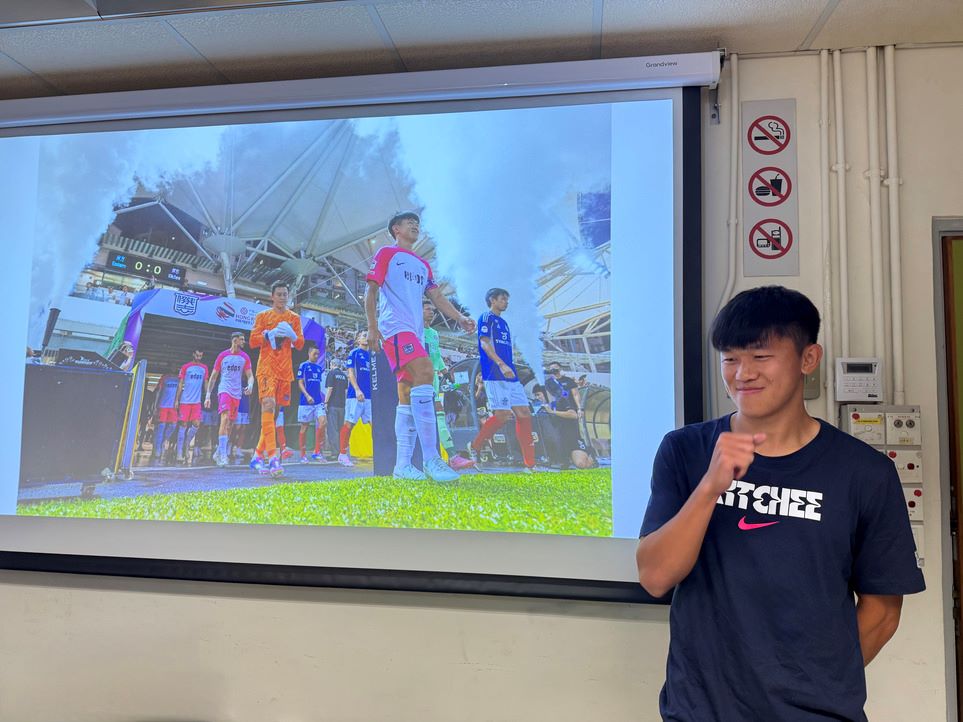From HSE to HKU: Lessons in Football

England taught him resilience, China taught him competitiveness, and returning home taught him responsibility. During the meeting at Hong Kong University Tan Chun Lok shared that his international experience helped him understand Hong Kong football flaws and formed him as a player and leader.
I listened to him in Hong Kong, where I am currently studying as an exchange student at the Higher School of Economics. Sports journalism courses here teach not only how to gather facts but also how to analyze human stories and see the cultural and systemic contexts behind events. Hearing the real-life story of someone who had an experience of playing in three countries was an experience that lectures and textbooks cannot provide.
His story is more than a tale of a career abroad. Lok is one of the few Hong Kong players who have passed a path through three football cultures. His story reflects his personal growth and illustrates how different cultural and sports systems form a character, worldview and approach to work.
His first major step in his international career was in England, where he spent four years trying to find balance. Lok began his career in Hong Kong youth teams, but at the age of thirteen, he won a scholarship to study in the UK. He described this time as a turning point. “Players there are taller, stronger, faster,” Lok recalls. Competing against more experienced and well-trained opponents forced him to change: he became stronger and more confident.
The English system, based on daily training, competition, and discipline, built his character. This is the reason why he quickly adapted to the professional league upon his return to Hong Kong.
The next chapter was the Chinese Super League: Lok signed with Guangzhou City and spent four seasons there. He recalls this period as one of the toughest in his career.The team featured world-class footballers — World Cup participants and former Premier League players. Lok joined them as a foreign player, which required him to constantly prove his worth. “It’s hard to earn their trust,” he said. He had to push himself to the limit to impress coaches and teammates.
When Chinese clubs faced financial difficulties, Lok decided to return home and join Kitchee. Playing abroad gave him the ability to look at local football from another perspective — to understand what young players lack and how the system could be improved.
Discussing the development of football, he noted that the main drawback is the lack of training hours: young players train only once or twice a week. With such a schedule, it's impossible to achieve significant progress. Lok believes that more opportunities to study and play abroad — especially in Europe, where a culture of training and teamwork is the part of everyday training — would help Hong Kong's football development. “England is on a completely different level — we should focus on learning from them,” he emphasizes.
These words have special meaning for me as for the student of the Higher School of Economics. Studying at this university taught me to see the processes and systems wider, to ask questions and to find not obvious answers. International exchange at the University of Hong Kong definitely became a continuation of this philosophy: I’m learning to adapt to the new academic standards. cultural features and approach to earning at the same time I am also using the knowledge and skills acquired in Moscow.
Lok’s international experience reminds that learning is not only about lectures and grades, but about how you apply what you’ve learnt in a new context. It shows that true preparation for life lies in adaptation, responsibility, and feeding back the knowledge gained into one's system to improve it.
Moving to another country, a new language, different learning standards — all of this forces you to grow. And, like Lok, you begin to understand that international experience isn't just about a pretty line on your CV, but about the ability to see yourself and the world from a different perspective.
This experience gave Loc a valuable thing — broader mindset, which is important for a team captain. For Lok, playing abroad was not just a career step, but a school of leadership and responsibility. His story reminds that real development is possible only with desire to learn, adapt and return the acquired knowledge to the native system.
Shared by

